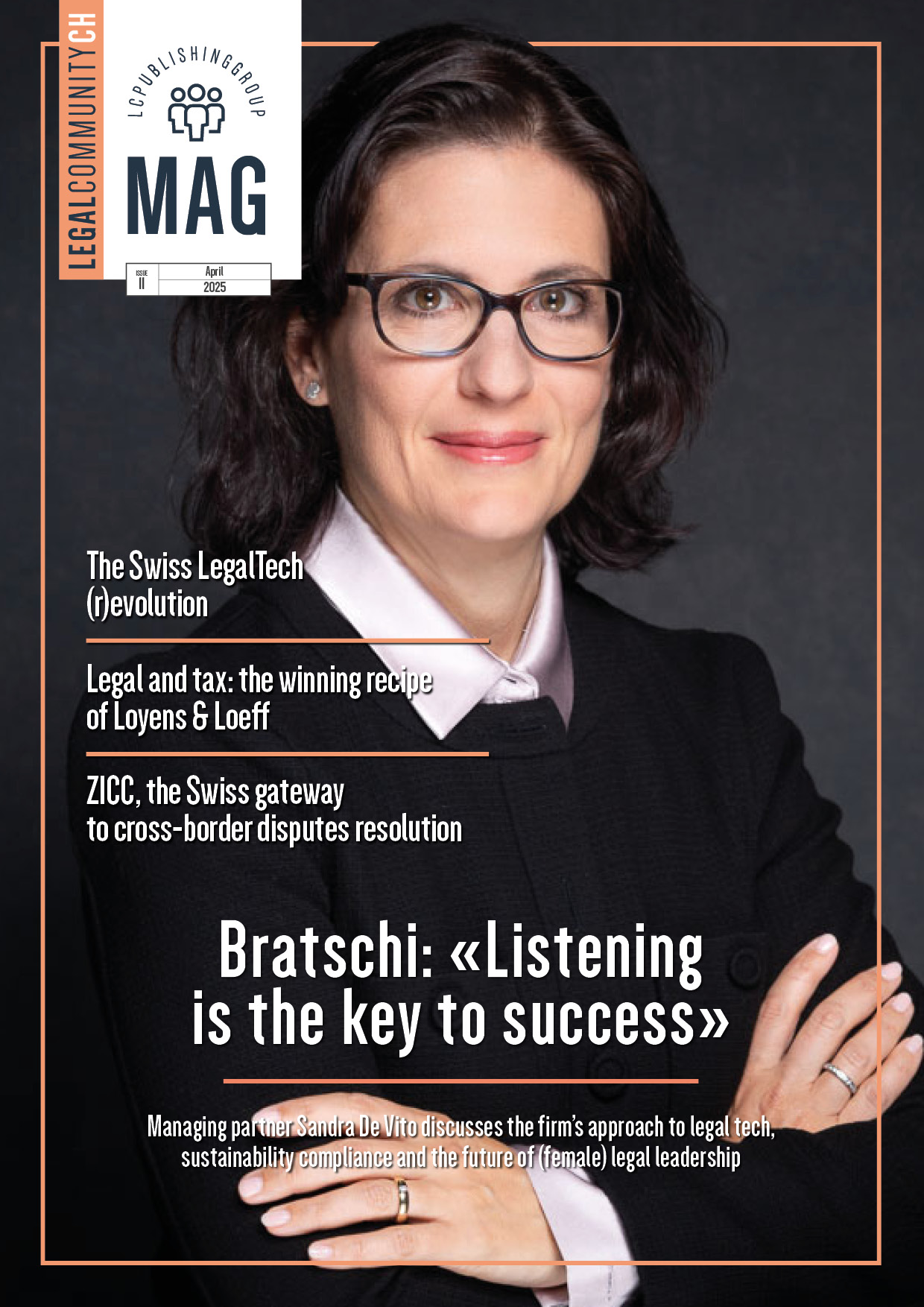Ansgar Schott: “Sustainability for financial institutions extends beyond ESG concerns”
by Mercedes Galán.
At Legalcommunity CH we have the opportunity to speak with Ansgar Schott regarding the sustainability requirements in Switzerland. Schott is a financial expert and a partner in the Financial Services Team at Baker McKenzie Switzerland. Based in Zurich’s office, he has been recognized as a leading banking and finance lawyer by several renowned publications. He is co-editor and author of the leading Swiss financial markets commentaries and lectures Law & Economics at the University of St. Gallen.
Could you please introduce yourself and briefly explain your background in this field?
As legal counsel to financial institutions, I have approached ESG primarily from a financial markets law perspective. We have advised several Swiss and global financial institutions on institution- and product-related ESG issues, where not only technical compliance issues but also topics such as reputational risks, litigation risks and shareholder activism play an important role.
Let’s dive into the topic. Could you provide an overview of the current ESG sustainability requirements and regulations in Switzerland?
Above all, a distinction must be made between the rules of corporate law, which apply generally to all companies insofar as they are “in scope”, and the rules of financial market law, which apply specifically to financial institutions and financial products, respectively.
From a corporate law perspective, companies of public interest are subject to certain rules on reporting on ESG matters. Further, special due diligence and transparency requirements apply to companies that source minerals and metals from conflict areas and in the case of child labour. In particular, this involves the verification of certain supply chains. Finally, particular transparency regulations apply to commodity companies. Companies trading in these commodities are, however, not subject to the new reporting requirement.
In addition, as mentioned, the financial sector is subject to particular ESG regulation. On the one hand, financial market regulation on ESG aims to steer financial flows in a climate-friendly way. In other words, it has a steering function. Since climate change indirectly affects financial institutions as lenders and business partners to the real economy, it is also intended to serve the stability of financial institutions and the financial market. It is also intended to prevent the deception of customers (greenwashing).
Finally – and this must not be forgotten – ESG represents a marketing concept for Switzerland and especially for the Swiss financial industry: It is seen as an opportunity for the Swiss market to position itself as the world’s leading financial center in this area.
What are the key aspects that companies need to consider and what are your recommendations?
While it is true that discussions about the role of business in relation to human rights and environmental concerns are still evolving, not necessarily everywhere at the same pace, the direction of travel is clear. We have seen and will continue to see a hardening of soft law in the areas of human rights and the broader societal and environmental impact of businesses. For this reason, the focus of relevant resources should move from the analysis of legal nuances to the development of substantive answers to the question what a given company should do in order to address effectively ESG concerns in the extended enterprise.
In addition to our ongoing recommendation to develop and maintain a well-documented and effective overall compliance program, we recommend paying particular attention to the following items:
- Review and where required adjust governance to ensure appropriate leadership at the Board level in relation to ESG risks, including adverse impact the company’s activities may cause and legal risks the company may face.
- Designate responsible function(s) to monitor and provide ongoing advice in relation to the increasing body of laws and regulations in the area of ESG risk management requirements both in Switzerland and in your markets abroad. In this regard, consider moving to shared responsibilities, including the Legal and/or Compliance function.
- Review and where required adjust your Enterprise Risk Framework to address ESG risks within your risk taxonomy, including associated measures to address these risks.
- Review and where required adjust ESG risk management policies and processes across your supply chain and distribution network, including affiliates and third parties, on the basis of a solid risk assessment. In this regard, broaden and deepen your third party intermediary due diligence framework to address ESG risk factors and do so into tiers 2 and 3 of your chain. Place particular focus on conflict minerals and child labour, considering third party assurance.
- Review and where required adjust your reporting on ESG risk factors and measures you take to address these risks. Introduce internal assurance processes in relation to your reporting.
What about the Swiss Stock Exchange (SIX) and its own guidelines?
According to SIX rules and regulations, issuers have the option of notifying SIX Exchange Regulation by means of an opt-in that they prepare a sustainability report in accordance with an internationally recognized standard. This fact is published on this website for the information of market participants. In addition, companies are free to prepare and publish a sustainability report in accordance with an internationally recognized standard without notifying SIX. It is also permissible to include certain sustainability topics in their annual report. Issuers that make use of the opting-in are obliged to prepare the sustainability report in accordance with the chosen internationally recognized standard and to publish it on their website within eight months of the balance sheet date of the annual financial statements for five years.
Are there any specific disclosure or reporting obligations that companies in Switzerland must fulfill regarding their ESG performance?
ESG Reporting– According to articles 964a et seqq. of the Swiss Code of Obligations the Swiss ESG reporting obligation applies to companies of public interest (i.e. listed companies, banks, insurance companies and other supervised financial institutions) domiciled in Switzerland that, together with controlled companies in Switzerland and abroad, (i) have at least 500 FTEs on annual average, and (ii) exceed assets of CHF 20 million or revenues of CHF 40 million in two consecutive years. Companies that are controlled by a company to which the new reporting requirements apply, or that are subject to equivalent reporting under foreign law, are not required to prepare an additional report. Such rules came into force at the beginning of 2022; and further details can also be found in the Ordinance on Reporting on Climate Concerns, which will come into force on 1 January 2024.
The ESG report must include information necessary to understand the company’s business and the impact of its activities on the environment (including CO2 targets) as well as societal concerns related to employees, respect for human rights and the fight against corruption across their value chains.
The ESG reporting requirement is modeled after the EU Non-Financial Reporting Directive (Directive 2014/95), and the non-exhaustive list of topics that the report must cover tracks its model closely. Specifically, the report has to cover the following topics:
- the company’s business model (Business Model);
- the main ESG risks resulting from the company’s own operations and, where relevant and proportionate, its business relationships, products or services (Risk Assessment);
- the policies pursued to address these ESG risks, including due diligence applied (Policies and Due Diligence);
- the outcome of those policies (Outcome) and
- non-financial key performance indicators applied regarding the company’s response to ESG risks (KPIs).
If a company does not have policies addressing certain ESG risk areas, the report must include an explanation of the reasons for such gap (‘comply or explain’). The only defensible explanation that one could see is an assessment that a company’s activities do not raise concerns in a certain area.
The report may be based on national, European or international reporting standards, such as for example the OECD Guidelines for Multinational Enterprises or the standards of the Global Reporting Initiative (GRI). Further, companies may want to draw from guidelines the EU has issued on the methodology for reporting non-financial information. Under the above headings, these guidelines list out in detail the aspects that the ESG report should cover.
The report may be established in one of the Swiss national languages, or in English. It must be approved by the board of directors and the shareholders’ meeting and made electronically accessible to the public during a period of 10 years. However, unlike the company’s financial statements, the ESG report must not be audited.
How are these requirements enforced, especially within the context of capital markets? Are there any penalties or consequences for non-compliance?
Non-compliance with the new ESG reporting regime is subject to criminal liability. Non-compliance includes the inclusion of false statements in any of the newly required reports, the generic ESG Report and the report on compliance with due diligence measures in the area of conflict minerals and child labour, or the failure to issue any of these reports, or the failure to keep records of, or publish, these reports. If any of these acts is committed intentionally, the fine is up to CHF 100’000, if committed negligently, the fine is up to CHF 50’000.
In addition, deficient ESG due diligence or reporting may trigger civil liability under existing concepts, namely the liability of board members and management under article 754 of the Swiss Code of Obligations. Although the hurdles for successful derivative claims are notoriously high, it is conceivable that the increased specificity of risk management requirements may motivate activist shareholders to bring claims. For instance, in case instances of unmitigated child labour in the supply chain become public and bad press results in loss of business, the argument may be made that weaknesses in the compliance program caused damages to the company, for which management and the board should be made responsible.
Likewise, one cannot discount completely the possibility that the existing principal’s liability of article 55 of the Swiss Code of Obligations or other liability concepts will be used with more confidence to hold Swiss parent companies accountable for activities by their subsidiaries in high risk jurisdictions, given that the law itself states that due diligence requirements extend across the extended enterprise.
What particular rules apply with regard to financial institutions?
Climate-related financial risks
As mentioned, climate change also poses a risk to the financial institution itself, which depends on the real economy as a lender and business partner. This is referred to as climate-related financial risks. In this context, the Swiss Financial Market Supervisory Authority (“FINMA”) requires large financial institutions to disclose any climate-related financial risks and their impact on strategy and risk management.
It should also be mentioned that the Federal Council recommends that all Swiss financial institutions join the net zero alliances under the umbrella of the Glasgow Financial Alliance for Net Zero (“GFANZ”). Within the framework of these GFANZ net-zero alliances, financial institutions voluntarily commit to promoting the achievement of the net-zero target. Also, the Federal Office for the Environment, together with the State Secretariat for International Financial Matters, has offered all financial institutions the opportunity to subject their portfolios to a climate test on a voluntary and anonymous basis.
Further, the Federal Council recommends that all Swiss financial institutions apply the so-called Swiss Climate Scores where this makes sense. The Swiss Climate Scores provide investors with comparable and meaningful information on the extent to which their financial investments are compatible with international climate goals. In particular, they also show where the company in question stands in terms of “net zero” (Federal Council, media release, 29 June 2022).
And regarding greenwashing?
FINMA has published its expectations of financial institutions with regard to the prevention of greenwashing in collective investment schemes and in the provision of advice at the point of sale by means of a supervisory notice (FINMA supervisory notice 05/2021, 3 November 2021). In particular, it explains which constellations are considered deceptive according to FINMA’s practice due to a lack of transparency. However, the recommendations contained therein cannot be compared to the rules applicable in the EU (SFDR), which contain much more detailed and far-reaching rules.
Reference should also be made to self-regulation in the area of greenwashing: The Swiss Bankers Association (SBA) has issued binding minimum requirements for its members on the consideration of sustainability criteria in investment advice and asset management, which will come into force at the beginning of 2023 (SBA, Guidelines for financial service providers on the inclusion of ESG preferences and ESG risks in investment advice and asset management, June 2022). In addition, the Asset Management Association (AMAS) last year introduced binding rules for its members on transparency and disclosure for collective investments with a sustainability focus (AMAS, Self-regulation on transparency and disclosure for collective assets with a sustainability focus, 26 September 2022.). Such rules may under certain circumstances constitute the Swiss “best practice” standard, but they do not represent a minimum standard under supervisory law. Finally, it should be mentioned that the Federal Council recently published a recommendation to avoid greenwashing (Federal Council, media release, 16 December 2022), according to which financial services and financial products that are advertised as sustainable should be compatible with the declared sustainability goal or make an effective contribution to it.
However, it can be said that there are currently no rules for the point of sale that are generally applicable. Therefore, FINMA’s scope for action for efficient greenwashing prevention and avoidance is limited (see FINMA Risk Monitor 2021, p. 21 et seq.). A more comprehensive regulation on greenwashing at the legislative level envisaged by the Federal Council should close this gap.
What about risk management?
FINMA only recently formulated its expectations regarding the management of climate risks (FINMA, supervisory notice 01/2023, 24 January 2023.). According to this, all authorised financial institutions must proactively address the recommendations of international bodies and best practices in the market and critically review and further develop their instruments and processes where necessary. In addition, the ability of financial institutions to assess climate-related financial risks must be improved. For the time being, FINMA’s focus is on the large financial institutions, but this does not mean that the other financial institutions do not have to meet the expectations of FINMA.
And real estate in particular?
Real estate causes around a quarter of CO2 emissions in Switzerland. Making buildings more energy-efficient is thus one of the most important measures to reduce CO2 emissions. Among others, the Federal Office of Housing (BWO) offers further studies and information on this topic.
In the spirit of self-regulation, the Swiss Bankers Association has established principles for the granting of climate-efficient mortgages (SBA, Guidelines for Providers of Mortgages to Promote Energy Efficiency, June 2022.). Owners should be made aware of the need for energy-efficient renovations. These principles thus help customers to deal with climate risks. Further, they help the banks, which are exposed to climate risks in their function as lenders to deal with such risks. In this context, it should be mentioned that the Confederation is now providing data on the climate compatibility of the Swiss building stock (cartographic representation of the CO2 emissions of Swiss buildings; see FC Report, p. 9). Finally, in connection with mortgage financing, it should also be noted that FINMA generally classifies the credit risk in this area as significant (FINMA Risk Monitor 2022, p. 7 et seq.). Climate risks thus place an additional burden on the Swiss mortgage market, which has already become riskier.
How do these ESG requirements impact investment decisions in Switzerland? Are investors placing greater importance on ESG factors when considering investment opportunities?
You would have to ask a banker about that. I have been told that ESG-compliant products created alpha in the past, so it was easy to market such products. Today, that’s obviously not necessarily the case. So it’s becoming more difficult to offer them to opportunistic investors. My impression is that ESG compliance is an important factor, at least for Swiss UNHW.
In your opinion, what are the key challenges that companies in Switzerland face when managing ESG risks?
Many companies, including financial institutions, are unprepared for managing ESG risks, exposing themselves to increased risk of disputes. At the same time, increasing numbers of claimants are looking to use litigation to pressure businesses into changing their policies. For example, until recently, climate-related claims with the primary purpose of securing the disclosure of climate-related information have predominated. The focus is now moving away from complaints over inadequate disclosures to cases scrutinizing what prudent financial management means. In particular larger companies would be well advised to prepare for and mitigate this risk, for example, by reviewing their governance, corporate strategies and reporting around climate change and carbon reduction, as well as taking note of regulators’ expectations.
Arguably, wider ESG needs should supersede competition concerns around businesses engaging in coordination and cooperation. Companies risk potential antitrust claims where they come together to collaborate over ESG commitments. Care and advice are required over competition law compliance to avoid unintended consequences, especially as rules may vary from country to country.
Are there any notable trends or areas for improvement?
As recognized in the Paris climate agreement, financial institutions are critical players in the transition to a carbon neutral economy and, because of their role in allocating capital, they can act as a catalyst in achieving better environmental, social and governance (ESG) outcomes in society generally. Reflecting on their role in mediating the allocation of capital and their highly regulated nature, sustainability for financial institutions extends beyond climate change, and even further than wider ESG concerns, to encompass the very nature of their contribution to the economy and society as a whole.
Sustainability (and ESG more generally) as an issue has seen a tremendous rise in awareness since 2015, with the impetus acquired during the COVID-19 pandemic being maintained, despite the energy price shock from Russia’s invasion of the Ukraine. However, progress is slowed by the lack of common, consistent international standards over disclosure and classification. As cross-border investment requires the assessment of investee companies by investors in third countries and vice versa, generally accepted international classification and reporting standards are essential. The new International Sustainability Standards Board is working to address this issue by developing a comprehensive global baseline of sustainability-related disclosure standards.
Financial institutions face increasing commercial and competitive pressure to promote sustainable lending and investments. Market and investor expectations and commitments around sustainable finance and ESG considerations are changing the way global businesses operate and are at the very heart of decision making. In addition to financing green economic activities including renewables and recyclables, attention is rapidly turning to the challenge of “transition finance”, i.e., transitioning higher-emitting and hard-to-abate sectors in the economy to sustainability or net-zero.
Voluntary standards such as the UN-backed Principles for Responsible Investment and the recommendations of the Task Force on Climate-related Financial Disclosures (TCFD) are rapidly being reinforced by legal requirements. The EU is in the vanguard with its Sustainable Finance Action Plan that includes a system of classifying (by taxonomy) the impact of economic activity on the environment together with entity-level and product disclosures.
Litigation and enforcement represent a key risk for financial institutions with respect to ESG disclosures and reporting, as they may face exposure where, for example, ESG statements are misleading or incomplete. Guarding against liability for greenwashing is a major concern. It is vital therefore to understand the risks relating to ESG factors and the mitigation strategies available.
How can companies ensure the accuracy and reliability of their ESG reporting and data? Are there any best practices or guidelines that companies should follow?
To implement ESG credibly, companies need to implement ESG performance management. In particular, they must define KPIs and introduce ESG reporting and management approaches for ESG KPIs. Those seeking to gain a competitive advantage must be able to credibly integrate economic, environmental and social performance into strategic decision-making. To do this, there are numerous tools available to help companies collect the necessary data and generate reports based on ESG standards. However, the data generated by these tools can only be relied upon if the reliability of ESG-related end-to-end processes and data are assured. This requires implementing and verifying the effectiveness of appropriate IT general controls and IT application controls.
From a legal perspective, what advice or recommendations do you have for companies navigating the ESG sustainability requirements?
Given that the new requirements mark a conceptual shift from soft law to hard law and thus new concepts and terminologies should be embedded into Enterprise Risk Frameworks and Compliance Programs, we advise that companies should start preparing already now. In doing so, they should take the wider international context and possible further developments in important foreign markets into consideration as the new ESG reporting and due diligence requirements only mark the first step on a longer journey. This is particularly true for Swiss companies with operations in the EU where we expect broader requirements to receive the force of law in the coming years. Important measures will include the enhancement of the existing Compliance Program to address increasing expectations by stakeholders – and legal requirements – with respect to the management of ESG risks related to all business activities, including due diligence measures, with a specific focus on the supply chain.
















